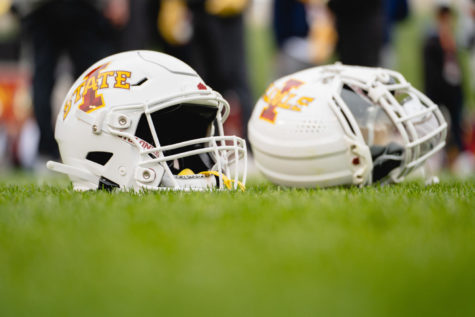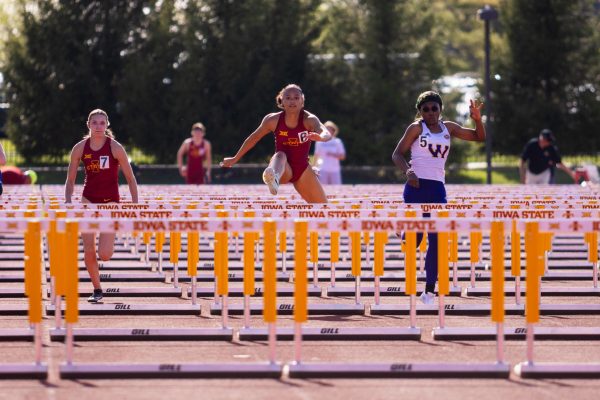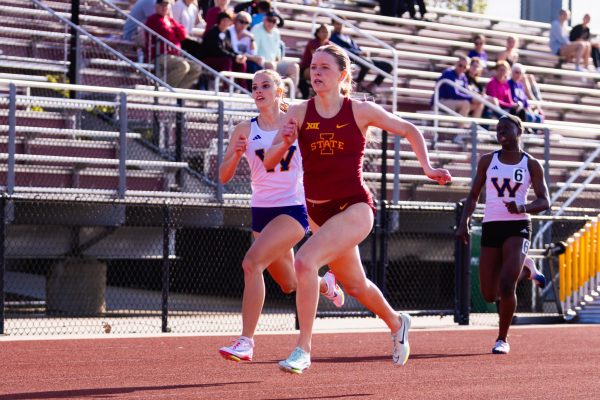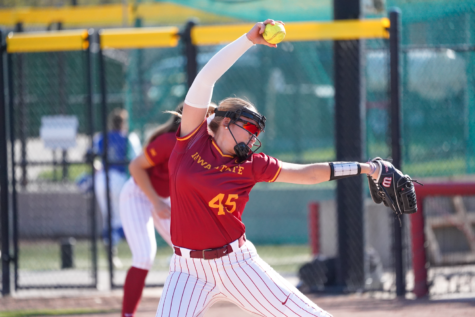Rounding the bases with Rob Conway
April 25, 2001
With 13 games remaining, the Cyclone baseball squad is already nearing its win total of the 2000 season.
The diamond men were 19-37 last season, and this year are close to the .500 mark, at 16-21-1. The team has won five of its last seven games, including a 17-1 trouncing of Northern Iowa last Tuesday.
Senior third baseman, Rob Conway has been an important part of the success in Ames. As a junior, his first year at the Division I level, he batted .298, leading the team in home runs and runs batted in. On the defensive end he was tops in assists.
This season, he has started another strong campaign. Through Monday, Conway led the team with a .327 batting average, as well as five other statistical categories. He was also second on the team in home runs with four.
Last Thursday, I was able to contact Rob and talk about his background, his feelings of playing on a team that has been axed for next season and his future career options.
Jeff Raasch: Let’s talk about your background first. Who is your greatest influence in baseball?
Rob Conway: That’s a tough one. I’d say as far as when I was younger, it was my dad for sure. He taught me how to read a box score when I was younger, and I could always play catch with him when I wanted to.
When I got older, my junior-college coach was really good. He projected his knowledge of baseball. He taught me a lot about the game and how fun it was.
JR: You grew up in Alaska, correct?
RC: I grew up in Juneau, but I was born in New York. I moved to Connecticut, then moved to Maryland, so I pretty much spent my whole life, since I was about seven, in Alaska.
JR: What are some of the differences between Alaska and Iowa?
RC: Iowa’s colder. It’s way colder. Juneau’s a maritime climate, so it’s similar to Seattle’s weather, but a little bit colder. Mostly you get rain, you know, we get our snow, but it doesn’t stay very long, and it doesn’t blow like here. The wind here is a killer. The winters are a lot harsher here, but they’re dark and dreary in Juneau.
JR: You played at Mendocino Community College for two years. Where is that located?
RC: It’s in Ukiah, California, which is northern California. They play in the bay area and the Sacramento Valley Conference. It’s probably the best league in northern California.
JR: How was it to make the jump from a community college to Division I?
RC: At first, I was anticipating it to be a lot harder to make the jump. After the first couple weekends, I realized that it wasn’t that much of a difference. The pitching’s a little bit better, it’s a little more consistent. Basically you’re seeing your best junior college type pitchers. You’re not seeing the No. 2 or the No. 3 guys from junior colleges, you’re seeing No. 1’s.
It’s definitely a step up, but I got a good situation here. The coaching staff made me feel pretty comfortable, so I just kinda stepped in and did my thing.
JR: What did you know about Iowa before you came here?
RC: You know, I had heard that it was a good baseball state. I really didn’t know much. About the only cities I could name were Des Moines and Ames. I signed really late, so I didn’t come on a recruiting trip. I just kinda took a gamble. I had some other offers, but I wanted to play in a real good conference at the Division I level so I took it and ran.
JR: What made you come to Iowa State?
RC: My top priorities were somewhere where I’m gonna get a respectable degree because you can’t play baseball forever. And Iowa’s schools are known for their education, so that attracted me at first.
And also, you know, the Big 12, you can’t really beat baseball in the Big 12. It’s great. I wanted to play the Texas schools, and Oklahoma. If you can go up against them and be successful, you can go up against anyone.
JR: You play third base, what do you like about that position?
RC: I’ve always been an infielder and don’t really have the quickness to be a middle infielder, so I just kinda moved over to third when I got to the college level. I like it because you get to challenge the hitters. It’s also more action.
JR: What do you feel is your best quality as a player?
RC: I’m a contact hitter. I try not to throw a lot of strikeouts up there, I try to put the ball in play. Last year, I was more of a power hitter. This year I’m concentrating more on putting the ball in play and hitting the gaps. I don’t think one part of my game sticks out. I try to be an all-around player.
JR: Do you like offense or defense more?
RC: I love to hit. I like the challenge. No one else can help you hit him. It’s you versus the pitcher. It’s a good feeling when you get the best of them because the percentages are definitely in their favor.
JR: What’s your favorite MLB team?
RC: The Orioles for sure. I’ve lived in Maryland, and they’re pretty loyal back there. I’ve always been an Orioles fan. I’ve always followed [Cal Ripkin] ever since I was little – him and Eddie Murray.
JR: What does the team have to do to make the Big 12 tournament?
RC: The top eight teams go to the tournament. It’s strictly by winning percentage against Big 12 Conference [teams]. Right now, we’re tied for seventh with Oklahoma. The only way to get in is to win two of the next four series. We’re looking to win the series against Missouri. That would make us look good, because they’re behind us.
We also have Oklahoma left. And then Texas comes to our place and we feel we have a good shot against them because our pitching has done a pretty good job for us and their hitting hasn’t been great. Then, hopefully when Nebraska comes to town for the last weekend we’re playing for something still. That’d be great. We have nothing to lose against [Nebraska]. They’re pretty legit.
JR: What is the atmosphere of the team right now after the program was cut a few weeks ago?
RC: I think that first week after . we dropped a game to Iowa, we dropped a game to Winona State, which we shouldn’t have, and then we got swept by Tech.
I think we’ve kinda just realized that we don’t want to finish our last season like that. It’s tough, you know. It’s easy to say that should motivate us to go out and play. But a lot of these guys are thinking, “whoa, where am I gonna be next year?” and the coaches, I’m sure, were thinking about what the hell they’re gonna do. We got over the shock of it all. We’ve kinda just realized that we just wanna have fun. We know we have a good chance of making this tournament.
That third game against Kansas has made everything upbeat around here. It was a big win, scoring four runs in the ninth. It’s a good spark. We’re on a pretty good roll right now. I think everybody’s kind of accepted it and I mean, we make jokes about it – about the program being cut. That’s our way of dealing with it. I think the guys really want to finish up the year on a good note. Right now we’re in a position where we control our own destiny.
JR: Are the majority of the underclassmen going to transfer after the season?
RC: I’m pretty sure everyone’s gonna transfer. I know a couple guys who don’t see very much playing time, or none at all, are gonna stay. Some guys are already talking to schools and schools have contacted them. Our coaches are doing a really good job of getting these guys looks by coaches. I’m pretty sure everyone wants to go somewhere and play. You only get to play for so long, so why not play.
JR: What are your plans after Iowa State?
RC: It’s kind of a weird situation because I don’t really know what’s gonna happen. At the end of the season I’m gonna go to some try-out camps, and see what happens with the draft, and if nothing comes out of that, then I’m gonna either try to sign as a free agent or maybe play some independent ball for the summer. And hopefully out of that, get picked up. If nothing happens after this summer, I don’t think I’m going to pursue it any longer. I have three classes to finish up in the fall and then I’ll be done, so next December I’ll be looking for a job in the real world unless I’m playing pro ball. I have an option to go do an internship this summer in my hometown. It’s a pretty good situation, but I don’t know if I’m ready to give up on the hope of playing pro ball.
JR: If baseball doesn’t work out, what do you want to do?
RC: I think I’d get some experience in some type of investment company – whether it’s investment banking or financial planning. If I like that, I’m going to try to become a certified financial planner.
JR: Is there anything else you would like ISU students to know?
RC: [This] weekend we play at home against Texas. It’s the last series we play while classes are still in session, so they could come out from there study breaks from finals and see how many people we can get out at the yard. Especially if it’s a nice weekend, and because they played in the College World Series last year. We’re playing good ball, and it’d be nice to get a lot of support out there for our last weekend of the season.
JR: Thanks for your time Rob, and good luck with the rest of the season.
RC: All right, thanks a lot.
















